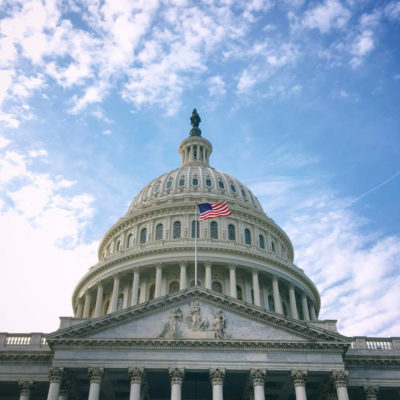The first federal COVID-19 stimulus package since March is on its way. Several Illinois politicians weighed in on the 900 billion dollar legislation that received last minute approval. On the floor of the U.S. Senate on Monday, Sen. Dick Durbin says that Congress may have to come back to address the ongoing issues with unemployment throughout the country:
“Last week, a group of Democrats and Republicans-including myself-came together and introduced compromise emergency relief legislation in the areas where we could agree. This package did not include everything I think we needed. But after eight months of inaction, it served as the catalyst to move much-needed bipartisan COVID-19 relief forward to help American families and small businesses.
“Like all compromises, this bill is not perfect. I’m disappointed that we weren’t able to agree on including much-needed funding for states and localities in this package. I want to be clear: I’m not giving up on funding for states and localities. This funding is essential in our fight against the pandemic and for our economic recovery.
“However, this legislation includes many important provisions including extending crucial unemployment benefits for hundreds of thousands of Illinoisans; offering a lifeline to struggling small businesses and nonprofits; providing direct checks to millions of American families; and providing funding for vaccine distribution, nutrition assistance, rental assistance, our hospitals and health care clinics, schools and universities, transit systems, and more.
“As we continue to face this unprecedented public health crisis, I believe that more funding will be needed. But this emergency relief will help us weather a tough winter ahead and should be signed by President Trump without delay.”
The federal measure is expected to enhance unemployment by $300 a week, not $600 a week as was passed earlier in the pandemic. The package also has money for vaccine distribution, a cash payment to most Americans of $600 and an extension of business grants. The $900 billion in COVID-19 relief is coupled with a $1.4 trillion federal spending bill. It includes $82 billion in funding for schools and colleges, but no money for state or local governments. It also Extends the federal eviction moratorium through January 31st as well as providing $25 billion in rental assistance. It also will increase SNAP food benefits for some by 15%. It also provides $7 billion nationwide to support broadband connectivity, including a $3.2 billion benefit to keep low-income households and the recently unemployed connected.
There are also several provisions for small businesses, healthcare up to including distribution of the vaccines for COVID-19, and education. Transportation funding as well as agricultural assistance are also included.
The massive over-5,500 page omnibus also includes some head-scratching measures including: sending $1.3 billion to the Egyptian army; $700 million to Sudan; $500 million to Israel; $453 million to Ukraine; $10 million for gender programs in Pakistan; $89 million towards maintenance and purchase of furniture for Senate buildings; and additional funding for gun violence research. In total, approximately 18% of the stimulus bill will go towards direct payments to American citizens. The omnibus also includes a new federal law about illegal streaming of copyrighted content, which is now a federal felony.
In all the bill does include the following:
Working Families
* Provides enhanced unemployment benefits at $300 per week and extends unemployment programs, including for about 160,000 Illinoisans claiming Pandemic Unemployment Assistance and 248,000 Illinoisans claiming Pandemic Emergency Unemployment Compensation;
* Extends the federal eviction moratorium through January 31, 2021, and provides $25 billion in emergency rental assistance to help keep families in their homes;
* Allows states to waive Pandemic Unemployment Assistance over-payments for individuals who acted in good faith;
* Addresses hunger by increasing SNAP benefits by 15% for nearly two million individuals in Illinois, provides $5 million to implement provisions from Sen. Durbin’s Expanding SNAP Options Act to increase retailer choices for online SNAP purchasing, and by provides $575 million in nationwide funding for food banks and senior nutrition programs, which serve more than 1.5 million people in Illinois;
* Provides $7 billion nationwide to support broadband connectivity, including a $3.2 billion benefit to keep low-income households and the recently unemployed connected;
Small Businesses
* Provides much-needed assistance for small businesses, including minority-owned businesses and nonprofits, including $284 billion for first and second round forgivable Paycheck Protection Program loans, key policy modifications to better assist struggling small businesses and nonprofits, and dedicated set-asides for the smallest businesses and community-based lenders;
* Provides $15 billion nationwide in dedicated funding for live venues, independent movie theaters, and cultural institutions;
* Provides $20 billion nationwide for the Small Business Administration’s EIDL Grant Program to assist small businesses in low-income communities;
Health Care
* Provides $55.5 billion in funding for vaccine development and distribution as well as COVID-19 testing and public health efforts, including approximately $1 billion to Illinois health departments for efforts to expand testing capacity and swiftly and equitably distribute vaccines;
* Provides $9 billion in funding and fiscal relief from looming Medicare payment cuts to hospitals and health care providers, including more than $350 million in expected financial assistance for health care heroes in Illinois;
* Provides $4.5 billion in mental health and addiction treatment funding to address the surge in drug overdoses, suicides, trauma, and stress from the pandemic, including an estimated $140 million for Illinois;
Education
* Provides $82 billion nationwide for education, including $54 billion for K-12 and $20 billion for higher education;
* Provides $10 billion nationwide in much needed support to the struggling child care sector and $250 million for Head Start;
State and Local Governments
* Extends the deadline for CARES Act state and local funding;
* Includes $500,000 increase for a total of $5.5 million for SIREN Act grants to rural fire and EMS agencies
Transportation
* Provides $14 billion in transit funding, including more than $500 million in funding for Illinois transit agencies;
* Provides $2 billion in airport funding, including more than $88 million for Illinois airports and airport concessionaires;
* Provides $1 billion in funding for Amtrak to prevent further furloughs and service reductions in Illinois;
* Provides $10 billion in highway funding, including more than $350 million for Illinois to support infrastructure projects and jobs created through Illinois’ Capital Program;
* Provides $15 billion in payroll support for airlines workers and $1 billion for airline contractors;
* Provides $2 billion in funding to aid Illinois bus companies;
Agriculture
* Provides $13 billion nationwide for agriculture, including row crops, $225 million for specialty crops, $400 million for dairy donations, $100 million for local producers that serve farmers markets, and $28 million for farmer mental health;
* Authorizes hog and poultry pandemic depopulation reimbursements;
* Authorizes USDA to make payments to ethanol and bio-fuels producers for unexpected market losses due to COVID-19;
* Provides up to $1.5 billion nationwide for food purchase and redistribution, and requires USDA to pursue improvements to assist local growers and ensure rural “last mile” deliveries; and,
* Provides $60 million nationwide for Sen.Durbin’s Food Supply Protection Act to help small meat and poultry processors with expansions and equipment.
18th District Congressman Darin LaHood says he voted in favor of the bill because he has seen firsthand the plight caused by COVID-19 throughout the district:
“As I traveled across the 18th Congressional District of Illinois in recent months, I heard from businesses on the brink of shutting down for good because of Governor Pritzker’s state-mandated closures, workers who still cannot access Illinois’ unemployment system, and health care workers who need additional support to care for COVID-19 patients. This bipartisan agreement includes important provisions to extend the Paycheck Protection Program, expand vaccine distribution, reopen our schools, and increase rural broadband access. No compromise is perfect, but this bipartisan bill will provide critical support to families, workers, small businesses, and our frontline health care heroes in Illinois.
“I continue to hold real concerns about the massive amount of deficit spending we are piling up and Congress’ yearly inability to work in regular order to fund our government. While Congress needs to act to provide COVID-19 relief, if we continue this spending pattern unchecked, the burden left on our children and their children will be unbearable.
“As we head into the new year, the health and economic impact of COVID-19 will continue to present our nation with serious challenges. This bill will provide important relief to those in need and resources to support key programs in Illinois. It is essential that the Governor, the General Assembly, and local elected officials in Illinois also work swiftly to allow businesses to safely reopen, get our kids back in the classroom, and alleviate the issues so many of my constituents continue to have with Illinois’ unemployment system.”
13th District Congressman Rodney Davis said he also voted in favor of the bill:
“I’m glad that Speaker Pelosi finally relented on her multi-trillion-dollar liberal wish list and agreed to support bipartisan, targeted COVID-19 relief. While I wish Congressional leaders could’ve come to an agreement on liability protections and additional support for local governments, this legislation provides vitally-needed support for small businesses, workers forced out of a job due to government orders, farmers, and many others who have been hurt by this pandemic. It also provides huge support for production and distribution of coronavirus vaccines, which will help us return to normal next year. In the weeks and months ahead, Congress must provide thorough oversight of these programs to ensure that they function as intended and provide Americans the support they need to get through these challenging times.”
Payments and distribution of the $600 payments are expected to begin as early as next week. The Senate acted swiftly Monday night, in a 92-6 vote, to approve coronavirus assistance, shortly after the House of Representatives passed the package. The measure now heads to President Trump’s desk. In order to avoid a shutdown, since federal agencies would have run out of money at midnight Monday, a seven-day stop-gap spending bill was also approved to allow time to process the combined relief and annual funding bills.




